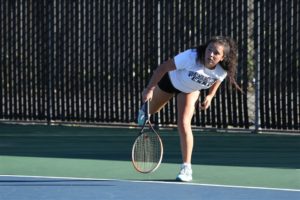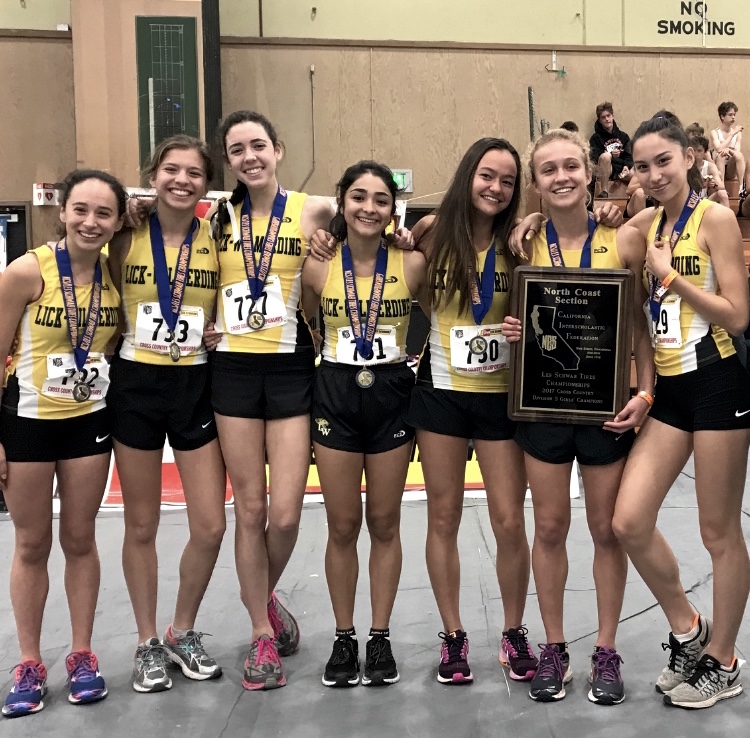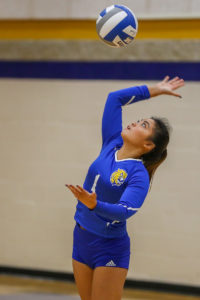The success of the athletic program here at Lick is a source of pride for the community. It is clear that the contributions of female athletes have been essential in building the athletic identity of the school. In the 2017 fall season, Women’s Varsity Volleyball and Women’s Varsity Cross Country both won first place in North Coast Sectionals. The Cross Country Team also placed third at states. Women’s Varsity Tennis was also awarded the title of BCL league champions for the fifth year in a row.

Although the women’s programs have experienced a tremendous amount of success, many female athletes in the past year have expressed dissatisfaction with the level of support given to their respective programs. One concern raised was the lack of female representation within the coaching staff. “I’ve been on two sports teams for three years and the fact that the first time I ever had a girl coach is in my senior year is very sad,” said Franny Jacobson ‘18, captain of the Women’s Varsity Tennis and Soccer teams. She added that being coached exclusively by men “doesn’t help or encourage females to play sports or continue with the sports program.”
During the spring of the 2016-2017 school year, a group of female players went to the administration to discuss some concerns surrounding gender inequity and sexual harassment throughout the athletics program. The players hoped that it would initiate change within the athletic department, particularly in regards to hiring more female coaches. Fortunately, these conversations have resulted in concrete changes that aim to create a more positive experience for female athletes.
This fall season, the athletic department has hired seven new female coaches, five of whom are serving as heads of their respective programs. Varsity Volleyball has acquired a new head coach in Lindsey Denman, who played Division 3 at the University of Puget Sound and also has a background in beach volleyball. The Varsity Tennis program is now coached by Jana Klein, who most recently served as the head coach for Saint Ignatius High School and has played at Cornell University for the college’s Division 1 varsity team. This has been the inaugural year for Lick’s Women’s Field Hockey Team. The addition of this new sport at Lick not only initiated the hiring of new female coaches but also gave women an additional opportunity to play a sport. Caitlin Beatty, a former Division 1 field hockey player at Indiana University and former coach of JV field hockey at Saint Ignatius High School, was brought on as the head coach of Women’s Field Hockey. Her assistant, Miranda Dershimer, also has extensive experience with the sport as she played Division 3 field hockey at Amherst College.

Min Yoo, a long-time female and male tennis coach at LWHS, acknowledges that one of the challenges faced by the athletic department is finding coaches. “It’s about resourcing the sports in a way that has some degree of parity… but we just can’t find the people. They just don’t exist or they are at another school,” said Yoo. Because it can be hard to find outside, capable coaches, the school often looks within the LWHS community. Yoo added, “There is always a need for coaches and lot of it is just because scheduling wise it’s kind of a nightmare if you work a regular hours job. I started because there was nobody else to coach.”
Despite this difficulty, the athletic department is looking to continue to grow the female coaching staff during the upcoming seasons. Currently, the athletic program consists of two male administrators, Eliot Smith and Spencer Yu. The athletic directors are currently searching for an experienced female to help coach the Women’s Basketball team in the winter, and in the spring they hope to bring on new individuals to coach Swimming, Women’s Lacrosse and Men’s Tennis. Although these new additions are not confirmed, the prioritization of female athletes and their concerns indicates a positive shift in the philosophy of the program.
When asked about how the volleyball team was able to win NCS and progress into the Division 1 States, captain Jessica Cusi ‘18 attributed their success in part to the new coaching staff. “A better practice plan due to the coaching really helped our team. I think the coaching has been a big improvement because we have a young female coach who is actually able to drill us and even show some examples. Now the women can see what the form is supposed to be, and with a younger female coach we have a better role model because she did play Division 3 in college and she knows what she is talking about,” said Cusi.

This was not the first year that Varsity Volleyball had a female coach. For the past several years, Mary O’Brien served as the head coach of the team. When discussing the other benefits of having a female role model, Cusi said, “I think [having a female coach] also gives a lighter vibe to the team. Sometimes when I have had a male coach outside of school the relationship has more of a boundary… it is easier to talk about team dynamics or any problems that are going on if you have a female coach.”
Looking to the future, Cusi hopes for a continued increase in female representation within Lick-Wilmerding’s athletic department and addressed the recent changes in the 2017 fall coaching staff. “I’ve heard a lot of good things about the new female coaches within the program overall. With the addition of new female coaches there has been such a positive response. Having a role model there for you is so important for everyone, whether they realize it or not.”
Shifting attention to the Varsity Women’s Tennis Team, Franny Jacobson ‘18, shared a similar appreciation for the change in coaching staff during the 2017 fall season. “We had more coaches, specifically female coaches, which in turn changed the coaching techniques. As a girl, I think that it provided my teammates with someone they could relate to and that they felt understood what it was like to be a female athlete,” said Jacobson. She cited the new practice philosophy as another contributing factor to the team’s success. “I think the tennis program this year was really effective because there were enough coaches to split the 40+ women into smaller groups and focus on improving specific technical skills. It also helped that the coaches split tennis players into groups based on the areas they needed work in rather than by skill level. This made everyone feel better about where they were as a tennis player and in general didn’t make it seem that we prioritized higher level players over those who wanted to learn.”

Another women’s team that has historically been successful is LWHS’s Women’s Varsity Soccer Team. Carly Brown ‘18, a captain of the soccer team, along with Jacobson, spoke to the past success of the program. In her freshman year, Brown was a part of the team that won BCL league and attributed the program’s achievement to a positive team mentality. “I think that it all has to do with team atmosphere and team relationships. Every year we have had the skills to win, but it all has to do with the team mindset and how we all feel about each other,” said Brown.
Brown also emphasized how her coach has helped shape her athletic experience here at LWHS. “What I really appreciate about our coach is that he is a no BS person, and you don’t find that a lot nowadays. To me it is refreshing to have a coach who will pull me off the field and say ‘you are playing badly so I am going to sit you on the bench.’ He doesn’t do it in a way that is mean, but in a way that I know he is being honest with me. I enjoy that because he coaches the boys in the same way. You know that he is saying the same thing to them because that is how boys get coached. I am an athlete, too, and I don’t need the fluff. I can just get it done.”
Despite having a positive experience on the team, Brown is also looking for some changes in the program, one of them being an increased level of transparency. She noted, “In general I think there is a disconnect between what is best for the teams and what the athletic department thinks is best for the teams. There needs to be more communication between the athletic department and the captains on what is actually needed. We have surveys for different classes [and the atheltic departement could do that, as well]. I feel like there should be more communication between the department and the actual players.”
Brown is also hoping for the addition of a strong female role model on the team. “We have had a number of assistant coaches, who have all been women, but they have been lacking in ability. That is frustrating because that reinforces that our only female role model on the team is not good at playing soccer – I think that it would be helpful to have a capable female coach, especially for this season because our coach has a torn ACL so he is really struggling to practice and demo with us.”

In addition to making these changes to the 2017-18 staff, the athletic department has begun to change how they train both returning coaches and new hires. In response to concerns about inappropriate conduct and ineffective communication skills of the male coaches that were raised last spring, the program has instituted a coaching seminar for fall staff. This seminar was facilitated by Anne Condren, the manager of the Human Resources department, along with LWHS’s Head of School, Eric Temple. When asked about the goal of the additional training, Condren said, “we talked about adult-student athlete boundaries in order to create a safe and respectful environment in the athletic department for both student-athletes and the coaches and also to create a set of norms.”
This new set of norms prevents coaches from friending students on social media, individually texting athletes, driving students alone in a car and showing favoritism through buying gifts or other forms of singling out individual players. On top of these new clearly highlighted expectations, there is also a general sexual harassment training that coaches are required to attend. Condren said that “The school does a two hour anti-harassment training that a majority of faculty participate in. It has been implemented in the last few years, and it is held every two years. The goal is to get both long term and short term coaches trained effectively and incorporated into the program.”
Another change in the department is the addition of the end of the season surveys in which students can share their concerns and feedback directly with the athletic director, Eliot Smith. Condren noted, “Coach Smith is motivated and wishes he had been more available to hear the student perspective, so he is very open to hearing concerns moving forward…students can come to him directly or even share feedback through anonymous surveys.”
Another possible change that LWHS could implement is the addition of a female administrator in the athletic department. Many Bay Area high schools, such as Marin Academy, Urban, University High School, Branson, International, and Convent, have either female head or assistant athletic directors. When asked about the possibility of adding a female athletic administrator, Condren said, “we would definitely like to have an additional female voice in the department.”
Females athletes have also expressed concern about the level of respect that is given to our female coaches and players. Maggie Drew ‘18, captain of Women’s Varsity Cross Country commented upon a lack of equal treatment for different genders in our community when she noted, “At Oracle I’ve noticed that for the boys game, everybody will be on their feet cheering and screaming really loudly and then for the girls game people are usually sitting down and aren’t as engaged and passionate about it.”

From a coach’s perspective, there also seems to be a lack of respect received between male and female coaching staff. Lisa Wu, Director of Admissions and the previous head coach of the Men’s and Women’s Varsity Tennis, noted that during her time coaching Men’s Tennis “there was a lot of bias and stereotypes from coaches of other teams that perhaps didn’t give us a lot of credit because I am a female coach of boys.”
Wu, someone who has always been involved in athletics, said, “I was very affected by [the concerns raised last spring and over the summer]. It made me very sad to learn that these experiences were happening without us really understanding or knowing. It is concerning to hear that some female athletes were hesitant to share feedback because of intimidation or worry of being stigmatized.” Female athletes and their allies need to continue to tell their stories and voice their concerns. Female athletes have already incited positive change but it is important that their voices continue to be heard.







